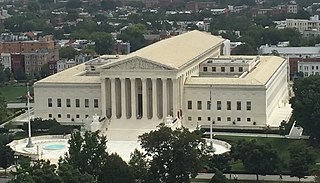This article needs additional citations for verification .(September 2014) |
The following is a list of United States court cases on cousin marriage. Currently only certain cases at the appellate level in the last sixty years are listed.
This article needs additional citations for verification .(September 2014) |
The following is a list of United States court cases on cousin marriage. Currently only certain cases at the appellate level in the last sixty years are listed.
| Name | Date | Forum | Description |
|---|---|---|---|
| Ex parte Bowen | March 21, 1952 | Court of Appeals of Kentucky [lower-alpha 1] | Held that due to the new Kentucky statute, the marriage was void and the veterans benefits should be denied to the spouse. |
| Matter of the Estate of Martin Emil Mortenson, deceased | October 29, 1957 | Supreme Court of Arizona | Cousin marriage not recognized because Arizona statutes declare the marriage "void" unless it was recognized in the place where solemnized, with the parties having resided in that place. In this case, the parties resided in Arizona and left to have the marriage solemnized in New Mexico. Wife received no share of the estate. |
| Mazzolini v. Mazzolini | December 24, 1958 | Supreme Court of Ohio | Held that because it was not declared void in statute, a cousin marriage solemnized elsewhere was valid in Ohio. Annulment not granted. |
| In re the Marriage of Earl E. Adams | December 31, 1979 | Supreme Court of Montana | Held that a first cousin marriage in Montana, where it was prohibited and where the courts were bound to declare it as void, was indeed void. The wife received no portion of the estate. |
| In the Matter of the Estate of Owen C. Loughmiller, Deceased | June 10, 1981 | Supreme Court of Kansas | Found that a marriage entered into outside the state of Kansas was valid because there is no statute in Kansas specifically voiding the marriage. The marriage was found valid and the separation agreement between the two parties was upheld. |
| Etheridge v. Shaddock | April 7, 1986 | Supreme Court of Arkansas | Found that a cousin marriage performed elsewhere was legal in Arkansas. A disputed change in child custody rights was therefore denied. Incidentally, it noted that a marriage between other closer relatives would not be recognized in this situation. [1] |
| Cook v. Cook | January 13, 2005 | Court of Appeals of Arizona, Division 1, Department A | Found that a cousin marriage performed elsewhere should be recognized because Arizona law at the time expressly directed such recognition, and although it was amended after the marriage, retroactive application of the law was not called for. Consequently, dissolution of the marriage was not granted. |

A court of appeals, also called a court of appeal, appellate court, appeal court, court of second instance or second instance court, is any court of law that is empowered to hear an appeal of a trial court or other lower tribunal. In much of the world, court systems are divided into at least three levels: the trial court, which initially hears cases and reviews evidence and testimony to determine the facts of the case; at least one intermediate appellate court; and a supreme court which primarily reviews the decisions of the intermediate courts, often on a discretionary basis. A particular court system's supreme court is its highest appellate court. Appellate courts nationwide can operate under varying rules.
In the United States, a state supreme court is the highest court in the state judiciary of a U.S. state. On matters of state law, the judgment of a state supreme court is considered final and binding in both state and federal courts.
In the United States, a state court has jurisdiction over disputes with some connection to a U.S. state. State courts handle the vast majority of civil and criminal cases in the United States; the United States federal courts are far smaller in terms of both personnel and caseload, and handle different types of cases.

The United States courts of appeals are the intermediate appellate courts of the United States federal judiciary. The courts of appeals are divided into 11 numbered circuits that cover geographic areas of the United States and hear appeals from the U.S. district courts within their borders, the District of Columbia Circuit, which covers only Washington, D.C., and the Federal Circuit, which hears appeals from federal courts across the United States in cases involving certain specialized areas of law. The courts of appeals also hear appeals from some administrative agency decisions and rulemaking, with by far the largest share of these cases heard by the D.C. Circuit. Appeals from decisions of the courts of appeals can be taken to the U.S. Supreme Court.

A trial court or court of first instance is a court having original jurisdiction, in which trials take place. Appeals from the decisions of trial courts are usually made by higher courts with the power of appellate review. Most appellate courts do not have the authority to hear testimony or take evidence, but instead rule solely on matters of law.
The federal judiciary of the United States is one of the three branches of the federal government of the United States organized under the United States Constitution and laws of the federal government. The U.S. federal judiciary consists primarily of the U.S. Supreme Court, the U.S. Courts of Appeals, and the U.S. District Courts. It also includes a variety of other lesser federal tribunals.

The Kentucky Supreme Court was created by a 1975 constitutional amendment and is the state supreme court of the U.S. state of Kentucky. Prior to that the Kentucky Court of Appeals was the only appellate court in Kentucky. The Kentucky Court of Appeals is now Kentucky's intermediate appellate court.

Deborah Louise Cook is a former justice of the Ohio Supreme Court and a senior United States circuit judge of the United States Court of Appeals for the Sixth Circuit, based in Akron, Ohio.

The United States District Court for the Western District of Kentucky is the federal district court for the western part of the state of Kentucky.
In law, an appeal is the process in which cases are reviewed by a higher authority, where parties request a formal change to an official decision. Appeals function both as a process for error correction as well as a process of clarifying and interpreting law. Although appellate courts have existed for thousands of years, common law countries did not incorporate an affirmative right to appeal into their jurisprudence until the 19th century.
Same-sex marriage in Kentucky has been legal since the U.S. Supreme Court's ruling in Obergefell v. Hodges on June 26, 2015. The decision, which struck down Kentucky's statutory and constitutional bans on same-sex marriages, was handed down on June 26, 2015, and Governor Steve Beshear and Attorney General Jack Conway announced almost immediately that the court's order would be implemented.
Kentucky Equality Federation v. Beshear is an American state-level court case started on September 10, 2013 in which the Kentucky Equality Federation sued the Commonwealth of Kentucky in Franklin Circuit Court claiming Kentucky's 2004 constitutional amendment banning same-sex marriage violated sections of the commonwealth's constitution. Case # 13-CI-1074 was assigned by the Franklin County Court Clerk. The lawsuit was conceived by President Jordan Palmer, written and signed by Vice President of Legal Jillian Hall, Esq. Jordan Palmer stated to the media that:
Kentucky added a facially unconstitutional amendment to its constitution via a ballot initiative process. Thus, the attempt to abrogate constitutional sensibilities in favor of a ballot initiative, as was done for Section 233A of the Kentucky Constitution in 2004, is against the very notion of equal protection as guaranteed to each and all of Kentucky's population. This should be held as true as a matter of law by the Courts, regardless of the ballot's outcome.